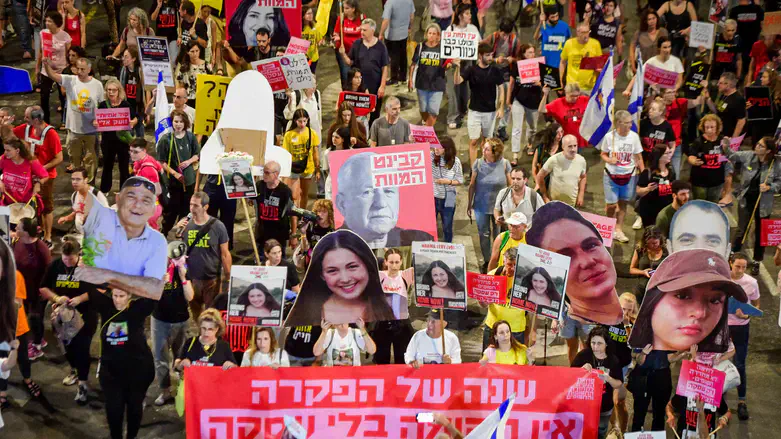
The ongoing conflict between Israel and Hamas has generated significant attention worldwide, especially regarding the fate of hostages held by Hamas since the brutal attack on October 7, 2023. Despite intense efforts by international mediators and mounting pressure on all sides, the question remains: is it worth it for Israel to negotiate with Hamas over the release of hostages?
In the aftermath of Hamas’s surprise attack, over 250 people, including Israeli civilians and foreign nationals, were taken hostage. The crisis has left families in torment, uncertain about the fate of their loved ones. The attacks were not merely military actions but involved heinous acts of terrorism. The recent recovery of the body of Youssef al-Ziyadne from Gaza, along with reports about his son, Hamza, further highlights the extreme brutality of Hamas's actions. For the victims' families, the question of whether their loved ones can be brought home, either dead or alive, is a matter of immense emotional and moral gravity. For the families of the over 800 fallen IDF soldiers and the thousands wounded fighting Hamas, it is just as vital that their sons did not sacrifice their lives and health in vain.
As Israel's Defense Minister Israel Katz emphasized, the urgency of bringing the hostages back is paramount. The Israeli public and its leadership have made it clear that they will not allow the terrorism of Hamas to dictate the future of their citizens. However, Israel faces a dilemma. Negotiating with Hamas is a complex and potentially dangerous proposition. While there is understandable public pressure for the return of hostages, such negotiations could set a perilous precedent, empowering a terrorist organization like Hamas. Negotiating with a group that seeks to destroy Israel and whose ideologies are rooted in extremism may not be a long-term solution.
International mediators, particularly Qatar, Egypt, and the United States have been actively pushing for a ceasefire and a deal to secure the release of hostages. US Secretary of State Antony Blinken has indicated that an agreement is close, and while optimism persists, the challenges remain daunting. Hamas, on its part, has shown some willingness to release specific groups of hostages, such as women, elderly individuals, and the severely ill, but only in exchange for large numbers of terrorist prisoners. These steps are crucial, but they are just the first phase of a broader negotiation framework.
Israel’s security is at stake. Netanyahu’s government has been firm in rejecting the idea of a ceasefire that benefits Hamas. It argues that conceding to Hamas’s demands could lead to an erosion of Israel’s strategic position. Moreover, Israel insists that Hamas knows the location of the hostages and should provide their release without preconditions. The idea of negotiating a ceasefire could potentially embolden Hamas, granting it a level of legitimacy and influence that Israel has long resisted.
Despite these concerns, Israel cannot afford to ignore the plight of the hostages. Every day spent in captivity, particularly under the terror of Hamas, exposes the hostages to grave physical and psychological harm. The remains of Youssef al-Ziyadne recovered only after an intense and risky operation, are a painful reminder of the brutal consequences of prolonged captivity. Families of the hostages, although not all, continue to push for a resolution, urging the Israeli government to take action to bring their loved ones home. Families of the fallen soldiers warn of losing all the gains of the war.
The situation is dire, and the international community has a significant role to play in ensuring that the hostages are freed. Israel has a moral duty to its citizens to explore all available avenues for bringing the hostages back, even if it means negotiating with a hostile enemy. A workable resolution to this tragic conflict must consider the security and well-being of Israeli civilians and prevent Hamas' rearming, while it brings security to Gazan civilians.
While it is understandable that Israel seeks a resolution for its hostages, negotiating with Hamas presents serious risks. It is not just a matter of returning hostages; it is about ensuring Israel’s long-term security and the preservation of its integrity as a nation. If Hamas were to regain power or leverage through a ceasefire deal, it would only prolong the suffering and insecurity in the region. That said, some temporary negotiations for specific hostages, as seen in the current diplomatic push, may provide a short-term resolution without necessarily compromising Israel’s long-term objectives.
For Israel, any negotiation should be approached with caution. While Israel’s priority is the safe return of its people, it must remain vigilant against legitimizing a terrorist group whose ideology is rooted in the annihilation of Israel. If a deal is to be struck, it must focus on ensuring the return of hostages while also securing the long-term peace and security of Israel.
Israel’s leaders must weigh the moral obligation to bring hostages home against the necessity of maintaining strategic security and long-term peace. If negotiations lead to the release of hostages without undermining Israel’s security, then they are worth pursuing. However, Israel must remain steadfast in ensuring that Hamas does not gain from its terrorist acts and that any negotiation is ultimately a step towards peace rather than a concession to terror.
Amine Ayoub, a writing fellow with the Middle East Forum, is a policy analyst and writer based in Morocco
